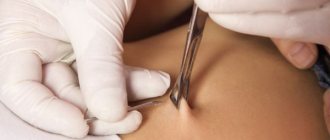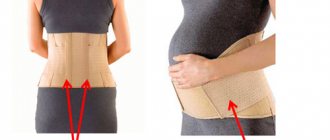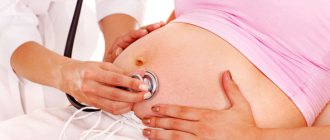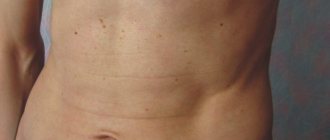Itchy skin during pregnancy can drive you crazy! Moreover, clothing often worsens the condition; constant friction of things against these itchy areas increases the discomfort. The expectant mother may feel irritated by constantly rubbing and scratching her skin, causing it to become even redder and itchy.
Believe me, it's not fun at all. No matter how unpleasant this “side effect” of a new interesting situation may be, when you understand the essence of the changes taking place, you will stop wondering why this is happening. Almost immediately after you become pregnant, your body begins to produce and release hormones that will gradually, over the next nine months, prepare you for the joyful event of the birth of your baby. These hormones can cause your skin to feel tight, dry, rough and itchy, and may even slightly slow your circulation over time.
Decreased blood flow combined with stretching of the skin (especially on the abdomen) to accommodate the baby can cause irritation and dryness. But you don't need to worry. Here are some of the best ways to treat itchy skin during pregnancy.
What causes dry skin during pregnancy?
Severely dry skin during pregnancy on the arms, face and legs occurs for various reasons, including high sensitivity and irritation in these areas. This is explained by the body’s increased demands on the volume of incoming fluid. For normal functioning of all organs and bearing a child, women need to drink about 2 liters of water daily. The volume of blood in the body inevitably increases and amniotic fluid is formed. The fluid entering the body is needed to meet the needs of the developing baby, so sometimes it is not enough to maintain good skin condition.
Against the background of altered functioning of the endocrine system, the activity of the sebaceous glands under the influence of estrogen is suppressed. Sebum is produced in smaller quantities than before, and the skin is less moisturized. The concentration of progesterone, which ensures skin elasticity, decreases at a certain stage of pregnancy, which aggravates dry skin and causes acne.
The development of hypothyroidism cannot be ruled out, which is diagnosed by a number of additional symptoms, including:
- thinning of the skin;
- brittle nails;
- hair fragility.
Many people wonder why the skin on the abdomen peels during pregnancy? The cause may be a lack of vitamin A in the body. To compensate for its deficiency, you need to pay attention to your diet, start taking polyunsaturated acids or vitamins from the pharmacy. Attention: vitamins against dry skin during pregnancy should be taken after first consulting with your attending physician!
If you have very dry skin during pregnancy, you need special care, the details of which you will now learn about.
Hormonal changes
From the first days after implantation of the egg, an intensive increase in the amount of hormones in the body begins, namely progesterone and estrogen. On the one hand, they “do” everything possible to prevent miscarriage, and on the other hand, they cause the very changes in hormonal levels that negatively affect the condition of the skin.
Progesterone produced in large quantities reduces the elasticity of the skin, but increases its sensitivity. At the same time, excess estrogen leads to disruption of the regulation of the function of the sebaceous glands. Insufficient sebum production causes the skin to become drier and begin to flake.
At the same time, the hair loses its natural shine. Since all women, without exception, experience hormonal changes, it is not uncommon for the skin to become very dry during pregnancy. Women with oily skin most often complain of acne, while women with normal and sensitive skin complain of flaking and irritation.
Skin care during pregnancy against dryness
You now know why you have dry skin during pregnancy, but we’ll figure out how to deal with this skin disorder further. It is necessary to adhere to certain rules of care. Start using soap or other products with a low alkaline content for washing (for sensitive and dry skin). Try to always study the composition so that it does not contain parabens and sulfates.
After bathing, treat your body with moisturizers for expectant mothers. You can buy them at any pharmacy, but make sure that they do not contain cortisone. Try to avoid foundations and powders, as skin sensitivity is increased during pregnancy, which means that even proven products can cause irritation and dryness.
Effect on the fetus
In most cases, a pregnant woman should not worry if she has dry skin during pregnancy. The most common cause of this condition is a banal allergy to food or household chemicals. The only danger to the fetus is irritation and peeling caused by infectious diseases, which is extremely rare in obstetric practice.
Thus, dry skin does not affect the baby’s development in any way. But it can cause discomfort to the expectant mother, since due to decreased elasticity, the pregnant woman may experience the following unpleasant symptoms:
- stretch marks on the chest, stomach or thighs;
- itching;
- peeling;
- irritation and redness of the affected areas;
- dandruff.
To eliminate the above symptoms, it is necessary to select products to moisturize and nourish the skin. But treatment must be prescribed or at least agreed with a doctor.
How to eat if your body skin is dry during pregnancy?
When the skin on your hands or other parts of the body peels, you need to add more foods containing omega-3 and 6 acids to your diet, which improve the condition of cell membranes and enrich the body with energy.
During pregnancy, eat seafood, nuts, seeds and use cold-pressed oil to make salads. Avoid fried, spicy, sweet and spicy foods, as such foods worsen your skin condition.
If dry skin on the face during pregnancy or on other parts of the body does not disappear for a long time, consult a doctor, who should determine the real cause of the problem and prescribe appropriate treatment or give advice.
Should you report your symptoms to your doctor?
Any change in condition during pregnancy should not be overlooked. It is imperative to inform your doctor about dry skin, despite the fact that this is a common occurrence for a pregnant woman. He will identify the cause and prescribe methods to eliminate it, which may include:
- change in the amount of fluid consumed;
- nutrition correction;
- taking vitamin complexes;
- use of special creams and other cosmetics.
Dryness is caused not only by the listed reasons, but also by some diseases or allergic reactions. The doctor must conduct an examination to promptly detect and eliminate them. A missed allergy can be passed on to the child.
How to get rid of dry skin during pregnancy at home
The basis of home care for dry skin consists of various creams and masks, with the help of which you can overcome dry skin of the legs and arms during pregnancy. Let’s take a closer look at the latter: you can easily prepare them yourself, so let’s look at some proven recipes for masks for dry skin for pregnant women:
- For the first mask, purchase ampoules with vitamins A and E at the pharmacy. A few tablespoons of chopped oatmeal should be mixed with olive oil and a few drops of vitamin. The paste is applied to dry areas and left for 15-20 minutes.
- For dry skin on your hands, feet and stomach, you can use a mask of oatmeal and yolk. Prepare some porridge with milk, add avocado oil and raw yolk. Apply the mixture to cleansed skin for 20 minutes.
- If your skin becomes dry to the point of cracking during pregnancy, try a curd mask. Mix cottage cheese with parsley juice, flaxseed oil, orange zest and fish oil. You should get a pasty mixture, which is applied to dry areas for 10 minutes and then washed off with cool water.
Now you know why the skin on the face, abdomen and other places peels during pregnancy, and you can also take the necessary measures on your own to combat the unpleasant disorder.
www.sportobzor.ru
Lack of vitamins and fluids in the body
During pregnancy, a woman's needs double. First of all, she needs to ensure sufficient fluid intake into the body. Water is necessary not only for the baby and mother, but also, to some extent, for the formation of amniotic fluid. To maintain optimal water balance, a woman needs to drink up to 2 liters of liquid per day, including first courses, tea, juices, etc.
Dry skin during pregnancy may be a consequence of a lack of vitamins, primarily A and E, which are responsible for elasticity. The diet of a woman carrying a child must include beef liver, eggs, sea fish, butter, carrots, beets and other products.
Skin pigmentation
Pigment spots and freckles may appear on the skin of the face during pregnancy. If you notice that the skin on your face begins to become covered with light brown spots in the forehead and cheeks, or if your nipples or moles on your body darken, do not try to immediately apply various whitening measures. As mentioned above, everything will pass after the birth of the child. Just try to avoid direct sunlight - wear a hat and use sunscreen. It must be said that dark-skinned women are more susceptible to such misfortunes than women with light skin.
Navel pain and specialist consultation
In what cases does a woman need to see a doctor? Pregnancy is not a reason to wait until the discomfort goes away on its own. If you are bothered by pain in the navel area and it does not go away, you cannot tolerate it under any circumstances; you need to see a doctor. You can call your gynecologist and tell about your feelings. A woman needs to describe the nature of the pain as accurately as possible so that the doctor can assess her condition. The pain can be cutting, sudden, it seems as if the navel was pierced with a thin needle. Then everything calms down and repeats itself again. A sharp or aching pain may occur. All this, as well as the regularity of the recurrence of pain, should be described to the doctor during a telephone conversation or at an appointment. Only in this way will the doctor be able to assess the woman’s condition and help her get rid of unpleasant sensations.
When you urgently need to call an ambulance:
- if diarrhea and vomiting do not stop within 24 hours;
- with severe headache, darkening of the eyes, dizziness;
- if the woman has lost consciousness;
- if your pulse quickens;
- sharp pain at the slightest movement;
- a painful lump appeared in the navel area;
- body temperature increased;
- with bloody discharge from the genital tract.
Sharp attacks of pain, when a woman is covered in sweat, has difficulty breathing, weakness and dizziness appear, these symptoms cannot be ignored, it is necessary to urgently call an ambulance in order to deliver the patient to the department as quickly as possible.
Dry skin, stretch marks
A third of pregnant women experience excessive dryness of the skin of the face and body. The reason is that progesterone, which is responsible for the safety of the fetus in the womb, actively working during this period, suppresses the initiative of estrogen, which is responsible for skin health. To combat dry skin, try to moisturize it as much as possible. Wash your face with cool water. When cleansing your makeup, use a special milk to remove it. Do not wash off the remaining milk with water; it is better to remove it with a cotton swab.
If your skin is excessively dry, it is not recommended to clean it with soap. For nutrition, use a moisturizer containing vitamins. It will help make your skin feel moisturized longer. But when choosing care products, remember what situation you are in and buy creams that contain natural ingredients. A specialist can recommend comprehensive care for dry skin during pregnancy. Consult a cosmetologist or dermatologist for advice.
Due to loss of elasticity, the skin in the chest, abdomen and thighs becomes stretched. Striae (stretch marks) appear. During pregnancy, stretch marks appear pink or purple. After childbirth, unfortunately, they will not disappear completely, but will become less noticeable. Heredity is the main cause of stretch marks during pregnancy. But you can try to prevent their occurrence with the help of proper nutrition (maximum consumption of proteins, fruits and vegetables), and special underwear for pregnant women (bras, bandages). At the first appearance of stretch marks, you can rub a cream prepared at home into problem areas: half a glass of olive oil and aloe juice, 10 drops of vitamin E and 5 drops of vitamin A. Store this cream in the refrigerator and rub it in in a circular motion for two months.
Dry skin can cause stretch marks during pregnancy. Stretch marks themselves are not harmful to health. They do not hurt or cause discomfort to the woman. A few years after the birth of a child, if you still cannot come to terms with the formation of stretch marks on the skin, know that in our age of technology we have already come up with ways to deal with them. Such as mesotherapy, ozone therapy, etc.
If your belly button hurts
Pain and discomfort in pregnant women may be due to the fact that the skin is stretched, the navel protrudes, and the baby inside is growing rapidly. Sometimes it seems as if the navel is being stretched from the inside. This process is completely natural; new sensations should not frighten a woman.
As soon as childbirth passes, the navel returns to its original place, and the painful sensations disappear. If you are not bothered by colic, fever, abdominal pain, or diarrhea, then you should not be afraid of a protruding navel.
The reason that pain develops in the navel area may be heavy physical activity during pregnancy. The abdominal muscles tense, as a result the woman feels pain and tingling. If muscle tone is weak, an umbilical hernia develops, which persists after childbirth. The longer the period, the greater the likelihood that this pathology will develop.
The hernia itself is not a dangerous disease. If a woman wears a bandage and follows the doctor’s recommendations, then there is nothing to worry about. When a hernia develops, you should not lift weights or put too much stress on the body, as this will lead to intestinal strangulation. This situation requires urgent surgery, which is extremely undesirable during pregnancy.
If the pain in the navel area is minor and does not bother you, you do not need to pay attention to it. They only confirm natural changes in the body.
However, sometimes a protruding and painful navel is a sign of a serious illness:
- Appendicitis in this case, the pain will spread to the entire right side of the abdomen.
Gastrointestinal infections, pain is accompanied by nausea, vomiting, diarrhea, and high fever.
Other gastrointestinal diseases.
Gynecological diseases, which often become acute during pregnancy.
If a woman feels discomfort, it is better for her to seek help from a doctor. Perhaps the situation is not serious and there is no need to worry. Laboratory tests will help to conduct a thorough diagnosis. However, it is very dangerous to carry out an independent course of therapy for a pregnant woman. It’s better not to take risks and trust your doctor.
For most women, a long-awaited pregnancy does not always mean a joyful mood and excellent health. Pregnancy is a serious test for the body; you need to adapt to a new state, and this causes discomfort for the expectant mother. Even if a woman is absolutely healthy and has no chronic diseases, surprises may await her during pregnancy: back and lower back pain, weakness, dizziness and pain in the navel. We’ll talk about why this happens and what causes discomfort in the navel area.
The second trimester of pregnancy is a difficult test for most women, because the fetus begins to grow rapidly, the tummy becomes rounded, the skin in this place loses its elasticity and quickly stretches. This is a natural process during pregnancy. During this period, a woman may feel discomfort in the abdominal area, namely, her navel hurts. This may be due to rapid growth of the fetus or for another reason not related to pregnancy.
Itchy skin
Due to the same raging progesterones, a pregnant woman may also suffer from itchy skin. It may haunt her throughout her pregnancy or appear from time to time. More often the skin begins to itch in the evening. Stretch marks, excess weight of a woman, as well as chronic liver diseases can contribute to skin itching. Watch yourself. If itching appears in stretch marks even after taking a hot shower, you can relieve it with any rich cream, as well as taking a cool shower several times a day.
Other causes of itchy skin may be:
- Liver dysfunction – observed in the third trimester; in addition to itching, it can manifest itself in the form of redness of the extremities, which subsequently spreads throughout the body;
- Cholestasis of pregnancy is the presence of bile in the intestines. Appears in the last months of pregnancy. In Russia it is observed extremely rarely.
- Skin diseases - fungus, psoriasis, eczema.
- Allergy to household chemicals, citrus fruits, seafood;
- Itching in the vagina can be caused by fungal diseases of the microflora of a pregnant woman. The most common fungus is thrush.
For any manifestation of skin itching on the skin of the face, body and genitals, a pregnant woman must consult a doctor who will identify the true cause of its manifestation and prescribe the correct treatment.
To summarize, we can conclude that during pregnancy you should listen most carefully to your health, since its condition is directly related to the health of the unborn child. Pay attention to changes in skin condition. To maintain it in good shape throughout the entire period, it is not enough to perform one-time procedures. Only general care, proper nutrition, and a healthy lifestyle will help you cope with unpleasant changes in the condition of your skin.
What kind of “surprises” does our pregnant body present? Every woman pays her own price for the birth of a long-awaited child. And let it be as insignificant for all of us as the opportunity to survive that same skin itching, pigmentation, dry skin and stretch marks on it.
ymadam.net
Drug treatment
If during pregnancy dry skin is very flaky and itchy, which is accompanied by the appearance of purulent lesions on scratched areas, the woman should immediately consult a dermatologist. Only a specialist, after an examination, will be able to prescribe medications that will not harm the expectant mother and child.
- "Bepanten." The drug, which improves tissue regeneration, is widely used in various pathologies. The cream should be applied in a thin layer to the affected surface, lightly rubbing it in. It is recommended to use 1-2 times a day.
- "Pantoderm". The cream is indicated for use on scratches, cracks and other small wounds with a risk of infection. It is used externally 1 or several times a day.
- "D-Panthenol". The drug is widely used for dermatitis and various skin diseases. "D-Panthenol" is allowed to be used during pregnancy and breastfeeding.
Causes of dry skin during pregnancy
Dry skin during pregnancy can occur in different parts of the body. Most often the face, neck, arms, and legs are affected. Irritation and itching may bother a pregnant woman in the abdominal area. The main causes of dry skin during pregnancy:
- violation of the drinking regime, balanced nutrition;
- stretching of the skin;
- changes in the functioning of the endocrine system;
- hypothyroidism
- Water imbalance is one of the most common causes of dryness and flaking of the epidermis. It can be difficult for a woman who drinks a small amount of water per day to adjust to a new drinking regimen. And the developing embryo needs water to form the body and accumulate amniotic fluid.
Poor nutrition, depleted in vitamins and fatty acids, can also cause excessive dryness and flaking of the skin during pregnancy.
- As the fetus grows, the abdominal skin stretches, accompanied by itching and peeling.
- While expecting a child, hormonal levels change, which entails a decrease in the formation of the female hormone estrogen. A drop in estrogen levels causes a decrease in the secretion of the sebaceous glands and a decrease in the elasticity of the skin.
All these reasons are temporary; with the birth of a child, dryness and flaking disappear and no longer bother the woman.
- Hypothyroidism is a disease of the thyroid gland in which the production of thyroid hormones is disrupted. The disease is manifested by a small list of symptoms, in particular, weakness, fatigue, swelling, and dry skin. Peeling of the epidermis of the hands is observed, especially in the elbow area.
Important: Pregnancy during hypothyroidism is problematic and can result in fetal death, so it is necessary to visit a doctor before planning it to prescribe treatment. If the diagnosis is established already during pregnancy, you need to remember that only careful and timely implementation of all the endocrinologist’s prescriptions can guarantee the preservation and health of the developing baby.
What to do about dry skin during pregnancy?
Following all the recommendations of a gynecologist and endocrinologist will help protect the body from dryness, peeling, cracks, and itching. Basic rules prescribed for a pregnant woman to keep her skin in good condition:
- You should drink at least two liters of water in the first trimesters of pregnancy. From 20 weeks, the amount of water can be limited to one and a half liters. Make sure there is no swelling.
- Add fortified foods to your diet: fish, carrots, butter, vegetable oils, and other foods recommended by your doctor.
- Change the rules for caring for problem skin. Scrubs and peelings are not needed during pregnancy. It is advisable to use mild soap, hypoallergenic gel, which gently cares for the body. After a shower, it is useful to lubricate your face, neck, stomach, arms, legs with sesame and olive oil.
- Pharmacies have special masks and creams for dry skin in pregnant women. Consult your doctor to determine which remedy is best.
- Treatment of skin diseases and dermatitis should be carried out under the strict supervision of a dermatologist and gynecologist.
The growing fetus causes itching, stretching of the skin and abdominal muscles, and therefore also needs protection with special creams or home remedies.
Peeling and dry skin of the hands during pregnancy is an unpleasant condition that can be helped by home remedies.
Home remedies for itching, flaking of the body
For severe itching of the body, folk remedies help - masks, lotions. A mask made from a teaspoon of honey, cream, and one yolk protects the skin well. It can be applied to the face two to three times a week. A mask of warm honey and olive oil helps protect against flaking of the whole body. The mask is applied to the body for twenty minutes and washed off with warm water.
Homemade cream made from pork and lamb lard protects and nourishes hands. This cream should be used at night. In the morning you need to wash your hands with warm water and mild soap and lubricate them with cream.
Important: Do not take a hot shower. Hot water dries out the epidermis and can lead to premature birth. After taking a shower, it is useful to lubricate the body with massage oil, which maintains the moisture and elasticity of the epidermis.
Dryness, itching, flaking of the skin are unpleasant phenomena that occur in a third of all pregnant women. You can get rid of this scourge. You only need nine months to follow all the hygiene rules for women carrying a child under their hearts, eat well, drink enough fluids, regularly visit the gynecologist, and follow all the doctor’s recommendations. Positive emotions, daily walks will add positivity, help make the days of waiting for the birth of such a long-awaited, such a beloved child joyful, happy.
kseroz.ru
Pemphigoid of pregnancy
Pemphigoid of pregnancy Pemphigoid of pregnancy is a very rare autoimmune disease, affecting on average 1 in 40,000 to 50,000 pregnant women.
Signs, symptoms and character
This dermatosis, which occurs in the second or third trimester, causes red, itchy nodules to form around the navel and spread to other parts of the body over several days or weeks. The face, scalp, palms, and soles of the feet are usually not affected. After two to four weeks, the papules turn into large, red, fluid-filled blisters. They may decrease or go away on their own late in pregnancy, but 75–80% of women with pemphigoid gravidarum experience flare-ups during labor. The rash usually goes away after the baby is born without treatment. Outbreaks of pemphigoid in pregnancy often occur in the postpartum period (during menstruation, when using oral contraceptives). This dermatosis usually recurs in subsequent pregnancies and tends to be more severe.1
Causes
In this disease, the pregnant woman's immune system attacks the placenta. Placental tissue contains cells from both parents. Cells received from the father may contain molecules that are recognized by the mother's immune system as foreign.
Paternal cells are present in every pregnancy, but autoimmune diseases such as pemphigoid occur only in some cases. It is not entirely clear why the mother's immune system can react this way. But it has been observed that the placenta of women diagnosed with pemphigoid contains molecules known as MHC class II (major histocompatibility complex), which are not found in this location.
Treatment
If symptoms are mild, antipruritic creams such as topical corticosteroids may be prescribed. They soothe the skin by locally reducing the level of immune system activity in areas affected by the rash.
Over-the-counter allergy medications may also be helpful. These include the following foods that do not cause drowsiness:
- cetirizine;
- fexofenadine;
- Loratadine.
Diphenhydramine has a hypnotic effect and is best taken at night.
During pregnancy, always consult your doctor before taking any medications, even over-the-counter ones.
For mild cases of pemphigoid gravidarum rash, home remedies may also be suggested to combat the itching:
- cool the skin with ice or cold compresses;
- stay in cool or air-conditioned rooms;
- take baths with Epsom salts or oats;
- wear light cotton clothing.
If itching and irritation worsen, oral corticosteroids will likely be prescribed. Because these drugs work by reducing the activity of the immune system, the lowest effective dose should always be used.
How does it affect pregnancy and the fetus?
Pemphigoid of pregnancy, which usually occurs in the later stages, is not life-threatening for the woman or child. However, a 2009 study found that developing a rash in the first or second trimester can lead to poor pregnancy outcomes.
The study examined the records of 61 pregnant women with pemphigoid from the UK and Taiwan. Adverse outcomes found in women with early onset disease included preterm birth and low birth weight.
The study also found that treatment with systemic (oral) corticosteroids did not have a significant effect on pregnancy outcomes.
In rare cases (about 1 in 100,000), the rash may appear in newborns6, but it is usually mild and goes away within a few weeks.1
Causes of dryness
This phenomenon is the result of severe dehydration, since the body uses most of the fluid to maintain the functioning of vital systems. In addition, experts associate the appearance of dry skin with a sharp jump in hormonal levels that occurs in the body of every pregnant woman.
The diet of the expectant mother also affects the condition of the skin. If it is not varied and complete enough, then the body simply will not have enough nutrients to maintain the skin in normal condition.
One of the most pressing problems is stretch marks during pregnancy.
From this article you will learn whether it is possible to do manicures and other nail manipulations.
Types of rashes
When making a diagnosis, the doctor pays attention not only to the location, but also to the appearance of the rash. According to the last criterion, gynecologists distinguish the following types of rashes:
- Blister. It has a spherical or round shape, protrudes above the surface of the skin, and is dense. A blister appears almost instantly after an insect bite or upon contact with an allergen.
- Vesicle (bubble). It is small in size, filled with transparent secretion, and is a characteristic manifestation of herpes rash, allergies and eczema.
- Bulla (bubble). The formation is much larger than the vesicle. Bulla occurs as an allergic reaction to medications.
- Pustule (ulcer). This is a spherical or cone-shaped formation filled with pus. A pustule is characteristic of many pathological conditions of infectious or bacterial etiology.
- Spot. We are talking about an area of skin with a changed color of the dermis. During gestation, spots appear in the form of pigmentation of a longitudinal line in the abdominal area.
- Knot. This tiny lump, characteristic of wart rashes, is found in eczema and lichen.
How to properly care for dry skin during pregnancy?
The mother's dry skin does not pose any danger to the baby's health, so you should not be afraid of this. But, of course, such a condition can cause a lot of inconvenience to a woman. You should follow a few simple rules:
- Cleanse your skin thoroughly. For these purposes, it is best to wash your face regularly with cool, clean water and a small amount of a specialized cleanser. Do not use soap or other products that contain alkali. They are too aggressive on the skin and dry it out. A feeling of dryness can also occur when you wash your face too often.
- It is necessary to use special skin products with moisturizing and nourishing properties. In modern stores you can find a wide range of creams and masks that can be safely used during pregnancy. They will help restore damaged skin and protect it from the negative effects of the environment. When choosing a specific product, carefully read its composition. Remember that creams containing cortisone are strictly prohibited for expectant mothers.
- The key to healthy, beautiful skin is proper nutrition and a balanced daily routine. Don't underestimate the importance of sleep. Long, restful sleep will help maintain skin tone and moisture at the proper level.
- Try to minimize the use of decorative cosmetics, as well as various medications. Even if cosmetics did not cause you any negative reaction before, during pregnancy they can cause serious problems.
- Always carry a bottle of thermal water with you. This product will help quickly replenish the lack of moisture in the skin and relieve the unpleasant feeling of dryness. Before purchasing it, read the composition. You should avoid purchasing water that contains dyes or fragrances. They can cause skin irritation.
- Liquid should enter the body not only through the skin. It is extremely important to drink several liters of clean water per day.
- Peeling skin during pregnancy can be a signal that the body does not have enough vitamin A. Therefore, if you notice such symptoms, you should consult your doctor. Most likely, you will need to take special medications. You can compensate for the lack of vitamin A by eating a sufficient amount of fish oil, butter, spinach, apricots and some other foods.
- Essential oils can also help improve skin condition. They not only have a moisturizing effect, but also perfectly nourish the skin. For example, olive and sesame oils contain many vitamins. These oils should be applied to pre-moisturized skin and left for 20 minutes. Hazelnut oil has an antimicrobial effect. It is best to use it once every two days.
Important information for women: why do nipples peel?
Some women face problems such as changes in the skin on their breasts and nipples. Of course, this is a disturbing factor that should force a representative of the fair sex to see a doctor. But before you panic and worry, let's figure out what could be the cause of flaky skin on your chest and nipples. It also happens that such a phenomenon is caused by completely banal reasons.
Why might breast skin problems occur?
Sometimes peeling nipples are caused by completely harmless reasons. Moreover, it is banal factors that most often cause such changes on the nipples and around them. For example, an uncomfortable bra may well cause flaking, as can clothes made from synthetic materials. Therefore, if a woman notices the appearance of irritation on her breasts and nipples, she should first of all remember whether she has recently worn underwear made from non-natural fabrics.
Also, the reason that the skin peels can be an allergy, and the skin's reaction to the irritant can be unpredictable. If a girl has recently started using new hygiene products, for example, she has changed shower gel or body cream, she needs to give up these products and look at the body’s reaction. After all, even these banal products can cause peeling, so choose your body cosmetics carefully.
Pregnancy, breastfeeding and puberty can also cause peeling of the nipples and breast skin. Any hormonal changes can affect the functioning of the body, including causing damage to the epidermis.
pregnancy and hypertrophy of the left ventricle of the heart, what is it? Doctors call an increase in the size of the left ventricle hypertrophy. This is one of the most common changes in the structure of the heart muscle, which is detected after 50 years in most people. The function of this ventricle is
Some skin diseases can cause peeling around the nipples, for example, ailments such as urticaria, dermatitis
Source
Masks for dry skin
Various masks, which can be prepared from simple natural ingredients, will also help relieve the feeling of dryness and give the skin a well-groomed, beautiful appearance. The most effective recipes are:
- Vitamin-based mask. Today, in any pharmacy you can buy vitamins A and E, which are available in liquid form. Masks based on them perfectly moisturize the skin, making it firmer and more elastic. In order to prepare such a remedy, you need to take two tablespoons of oatmeal and mix them with a small amount of olive oil. Add three drops of vitamins E and A to the resulting composition. After you mix everything thoroughly, you can apply the composition to your face. Leave the mask on for 15 minutes.
- Mask based on honey and yogurt. This recipe is very easy to prepare. Simply mix one teaspoon of honey and natural yogurt without filler. To enhance the effect, you can add banana puree to the composition. Leave this mask on your face for 20 minutes.
- Mask based on yolk and oatmeal. Boil a small amount of oatmeal in milk and add a little avocado oil to it. Add one yolk to the resulting mixture. This mask should be applied to the face in a thick layer and left to act for 20 minutes.
- Pumpkin based mask. This product has long been famous for its nutritional properties. It contains a large number of vitamins and microelements that make the skin more elastic and perfectly moisturize. To prepare the mask, boil a small piece of pumpkin in milk. After this, the pumpkin must be pureed using a fork. Mix three tablespoons of the resulting puree thoroughly with a tablespoon of natural yogurt. After application, leave the mask on your face for 20 minutes.
- Mayonnaise based mask. Mayonnaise can be used not only as a tasty sauce for dishes, but also as a nourishing agent for restoring damaged skin. But store-bought sauce will not work for these purposes; you will have to prepare it yourself. This is not difficult to do. Using a blender, mix one glass of sunflower or olive oil with the egg. Add a little sweet mustard and three tablespoons of lemon juice. Beat the mixture until you get a homogeneous white mass. It should be quite thick. Simply apply the prepared mayonnaise to your face and leave for 20 minutes to take effect.
- Mask based on yolk and sour cream. In order to prepare such an effective remedy, you need to mix two tablespoons of full-fat sour cream with the yolk of one egg. To enhance the nutritional effect, you can add a little honey. Apply the mask to your face and leave for 20 minutes. This product perfectly nourishes the skin and gives it a beautiful, well-groomed appearance.
- Mask based on carrots and cottage cheese. To prepare this product, carrots must first be boiled. Once it becomes soft, it can be turned into a paste. Mix two tablespoons of prepared carrot puree with the same amount of fresh fatty cottage cheese. Add a little olive oil to create a nice consistency. This mask must be left on for 15 minutes.
- Avocado based mask. Avocado contains essential oils that can easily penetrate into the deep layers of the skin. Using this mask can make your skin moisturized, soft and elastic. Preparing this remedy is extremely simple. Simply mash the pulp of a ripe avocado with a fork and add a little honey and one teaspoon of fresh yogurt to the resulting pulp. It is better to leave this mask on for 15 minutes.
- Honey based mask. Natural bee honey has always been famous for its excellent nutritional properties. It can be used either in pure form or in mixture with other components. An effective mask is to prepare it by mixing a little honey, one yolk and a teaspoon of high-fat cream. You need to keep this mask on your skin for at least 15 minutes.
beremennim.net
Folk remedies
For dry skin of the face and body of a pregnant woman, it is recommended:
- Apply nourishing honey-based masks to your face at least 2-3 times a week.
- Periodically take a warm bath with milk, glycerin, essential oils, decoctions of flax seeds and oats.
- Moisturize dry skin of your hands with a special cream made from melted lard and lamb fat (1 tablespoon each). The resulting mass should be applied to the affected area, covered with polyethylene, and then wrapped in a warm cloth. Use at least every other day. Apply the product to your hands at night.
- When washing your face, use healing infusions of medicinal herbs (chamomile, calendula).
Causes of skin problems during pregnancy
We invite you to consider the factors that provoke skin problems during pregnancy in the context of their types:
- Due to changes in hormonal levels, some women may develop acne on the face, which in no case should be treated without a doctor. He will have to prescribe you a non-retinoid drug that will not harm the fetus.
- If a pregnant woman lives in cold climates, then most often she develops bluish spots on her legs, which go away on their own after childbirth.
- If the expectant mother is dark-haired and has pale skin, then chloasma may occur - a disease of the facial skin in which it darkens either completely or partially. This disease goes away on its own after childbirth.
- Due to increased blood flow in a woman's body during pregnancy, the skin may acquire a transparent effect.
- Due to the enlargement of the abdomen and breasts during pregnancy, the skin in these parts of the body begins to itch very much. As a rule, itchy skin during pregnancy appears in the second or third trimester. The face, by the way, can also itch because its skin swells.
- Miliaria may appear on the skin of a pregnant woman's body due to increased sweating. In the ninth month, the skin during pregnancy may begin to peel off, become covered with harmless blisters, and thereby bring a lot of discomfort to the life of the expectant mother. If the skin peels during pregnancy, this may mean that the pregnant woman does not have enough vitamin A in her body.
- Due to the increase in the amount of estrogen in the blood of a pregnant woman, the palms and feet may itch and become red. Therefore, while carrying a child, you need to care for the skin of your hands and feet with moisturizing creams.
- Stretch marks may appear on your stomach, thighs, and legs. This is the most common skin defect that appears in almost all pregnant women. They do not pose any danger. You should consult a doctor only if the skin in the area of stretch marks during pregnancy begins to hurt.
Diagnosis of the disease
Only a competent specialist can determine the exact cause of dry skin during pregnancy and make the correct diagnosis. If you notice irritation, peeling and itching on the face or other parts of the body, you should immediately contact your local gynecologist.
The doctor will conduct an examination, give a referral for a general blood test, and prescribe the necessary treatment, consisting of moisturizing creams, ointments, antihistamines, and vitamins approved during pregnancy. In particularly difficult cases, the gynecologist is obliged to refer the patient for a consultation with a dermatologist.
Skin care during pregnancy
Taking care of your skin during pregnancy is necessary. Here are some basic tips that every expectant mother can follow:
- Wash your face and hands regularly with cool water and special cleansing milk. Do not use soap, because it makes the skin dry even more during pregnancy.
- Be sure to use nourishing and moisturizing creams if you have dry skin from birth; during pregnancy it needs special care.
- Eat well. There should be plenty of vitamins in your diet. In addition, good sleep is important for the skin.
- Spray yourself with thermal water if your facial skin gets dry.
- Be sure to drink at least 2 liters of water per day to prevent your skin from drying out.
- Use essential oils that you are not allergic to. They will not only moisturize the skin, but also disinfect it.
Facial skin care during pregnancy
The skin of the face is like a litmus test, reflecting all the changes that occur in a woman’s body during pregnancy. Therefore, you need to care for it systematically and meaningfully:
- You should not use cosmetics that contain salicylic acid, as it is harmful to women and children.
- Use creams with natural oils rich in vitamins A and E.
- Do not steam your facial skin if rashes appear on it. In this case, it is recommended to consult a cosmetologist.
Abdominal skin care during pregnancy
During pregnancy, the skin of the abdomen suffers the most, as it constantly stretches. On the abdomen, the skin begins to thin and stretch marks form on it, which may darken or turn red. After childbirth, scars appear at the site of stretch marks, which always remain pale even when you sunbathe. Because of this, many girls have complexes and try to find magical remedies that will help them get rid of the skin defect.
Here are some tips to help you reduce the number of stretch marks on your stomach or completely prevent their formation (this applies to those girls who do not have a hereditary predisposition):
- Massage the skin of the abdomen using oil with vitamin A and E, which increase skin elasticity. It stretches better, so stretch marks do not form.
- Take a contrast shower to improve skin elasticity.
- Eat fresh fruits, berries and vegetables. Walk more in the fresh air and relax - this recommendation will not only have a beneficial effect on the condition of the fetus inside the womb, but will also make your skin beautiful.
Never self-medicate. Before you start dealing with a skin problem during pregnancy, be sure to consult your doctor and strictly follow his recommendations to avoid possible pregnancy complications.
beremennuyu.ru
Symptoms of diseases with pain in the navel area
It is quite natural if pregnancy proceeds normally and a woman feels slight discomfort in the navel area. But what to do if the pain intensifies? This may indicate the presence of serious illnesses.
Causes of pain in the abdomen and navel area during pregnancy:
- Intestinal infection. Accompanied by such unpleasant symptoms as weakness, nausea, increased body temperature. Pregnant stools are frequent and loose. What is the danger? The fact is that during frequent diarrhea and vomiting, the intestines are in good shape, which means that the muscles of the uterus also become vulnerable and premature labor may begin. An intestinal infection not only leads to the tone of the uterus, it enters the blood and can negatively affect the development of the child. This can also affect the course of pregnancy and is a threat of miscarriage. To get rid of unpleasant symptoms and infection, urgent hospitalization is necessary so that the woman is under the constant supervision of specialists. After all symptoms of infection have been eliminated, the woman will need additional examination - diagnosis of the condition of the fetus to make sure that the child is not harmed.
- Attacks of appendicitis. This is a rare occurrence during pregnancy, but no one is immune from it. Pain with appendicitis appears more in the right side in the lower abdomen, spreading closer to the ribs. A woman may experience nausea and vomiting, and her body temperature may rise. By the way, during pregnancy the appendicitis process moves, so in order to avoid misunderstandings and prevent an attack, urgent consultation with a specialist is necessary.
- If in the 2nd trimester a woman suffers from constant pain in the navel area and it is accompanied by constipation, vomiting, flatulence, and the pulse may increase, then these are the first symptoms of an umbilical hernia. A dense oval lump forms on the abdomen in the navel area. If you touch it with your fingers and press lightly, a sharp pain appears. In this case, you need to immediately go to the hospital and the sooner the better.
- Pathologies of internal organs (stomach, pancreas, liver). A woman suffers from pain not only in the navel area. It spreads throughout the abdomen, accompanied by colic, heartburn, increased flatulence, and nausea. Enzymes will help alleviate the condition and relieve pain. You need to undergo an examination and only after that the doctor will prescribe treatment. Remember that taking medications on your own during pregnancy is prohibited.
- Gynecological problems are accompanied not only by pain in the navel, the woman feels a slight pulsation in the lower abdomen, and vaginal discharge may appear. An urgent consultation with a gynecologist is needed to prevent the threat of termination of pregnancy.










